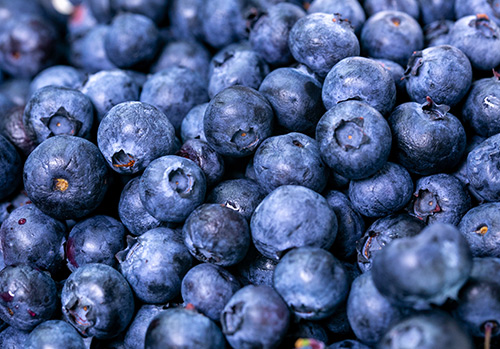
Photograph by Kelly on Pexels
Benefits of Blueberries
Blueberries, the small and tasty fruit, are a healthy snack choice to brighten your day. The blue fruit grows throughout the USA with farms in 38 states, but 98 percent of its production occurs in Washington, Oregon, California, Michigan, Minnesota, Texas, Georgia, Florida, North Carolina, and New Jersey. No matter the time of year, blueberries are in season somewhere. Farmers harvest the North American native fruit from April to September. While we experience winter months, South America enjoys summer, and blueberries are picked from November to March.
What nutrients are in blueberries?
One cup of blueberries boasts 3.6 grams of fiber, 16 percent of the recommended daily value of vitamin C, 24 percent of the recommended daily value of vitamin K, and 22 percent of the recommended daily value of Manganese.
Apples and peaches are great sources of antioxidants, but blueberries lead the way in antioxidative power. The antioxidants fight off harmful unstable molecules in your body. Flavonoids comprise the central antioxidant compounds in blueberries. Many of the blueberry health benefits come from the flavonoid called anthocyanin. Have you ever wondered what makes certain fruits rich in blue, purple, and red colors? Well, anthocyanin is responsible for those stunning hues. Researchers decided to review how blueberry juice impacted the health of 168 individuals over four weeks. The experiment featured a 20 percent decrease in oxidative DNA damage from free radicals in participants who drank one liter of blueberry juice daily.
Can blueberries fight diseases?
Many professional researchers have studied blueberries’ healing properties, and the findings are intriguing. One study sought to understand the changes in blueberry anthocyanins after drying or freezing the tiny fruits. The scientists found that untreated and pretreated dried blueberries suffered a significant loss of anthocyanins, a loss of 41 percent in comparison to the special flavonoid levels in the fresh fruit. The frozen blueberries did not have a significant difference in anthocyanin levels after three months of storage. The same researchers reviewed other scientific literature and noted that anthocyanins “significantly suppress the growth of cultured tumor cells and have been shown to have greater inhibitory effect than other flavonoids.”
Other research indicates that blueberry consumption can reduce the risk of cardiovascular disease, diabetes, and neurological issues. A 2011 study examined the association between habitual flavonoid intake and hypertension in men and women over 14 years. Researchers concluded that flavonoid anthocyanin might benefit people in preventing hypertension. They found eating foods with higher anthocyanin levels resulted in a 10 percent lower risk of incident hypertension. The scientists observed that women under age 60 experienced the greatest risk reduction.
Have Health Insurance Questions?
We hope that this information on blueberries is helpful for you.
Insurance is oftentimes overwhelming, and we want to shed light on the industry by answering your questions. Comment below and your question may be the topic of our next post!
If you liked this article, share it with your friends!
Empower Brokerage wants to help you find the insurance coverage you need and help you save money getting it. Stay on top of your health and give us a call at (844) 410-1320.
Get affordable health insurance quotes by clicking here.
See our other websites:

